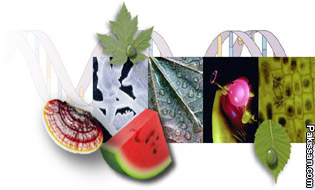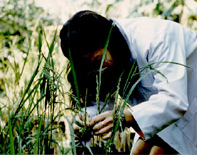|
Advisory /
BIOTECHNOLOGY
Biotechnology in plant breeding
Plant breeding is the practical application of genetic
principles to the development of improved strains of
agricultural and horticultural crops. Plant breeders can adapt
old crops to new areas and uses; increase yields; improve
resistance to disease; enhance the nutritional quality and
flavor of fruits and vegetables; and develop traits that are
useful for storage, shipping, and processing of foods.
Improved wheat and rice varieties sparked the green revolution
in the developing world during the 1960s and '70s. In
ornamental plants, breeders have developed larger and showier
flowers, greater plant vigor, and myriad types, shapes, and
colors.

Stone Age farmers improved crops through selection, choosing
at each harvest the largest seeds from the best plants for
sowing the following year. In so doing, over thousands of
years, they converted favored wild grass and legume species
into such crops as corn, wheat, and soybeans. In the 18th and
19th centuries farmers attempted to speed up crop improvement.
Some advances were made, partly through selection and partly
through trial and error, such as in the procedures used by the
American horticulturist Luther Burbank. Through the work of
Gregor Mendel, Hugo Marie de Vries, and others, the
development of the science of genetics at the beginning of the
20th century established a firm scientific base for plant
breeding. Since that time it has continued to develop in
sophistication and accomplishments, enabling professional
plant breeders to achieve predictable results and uniform
quality.
Plant breeders use numerous methods to develop new varieties,
but their primary techniques of development are selection,
hybridization, and the use of mutations.
World population is nearly 6 billion, and is increasing at the
rate of 1.23% each year. This is very alarming situation. As
the population is increasing day by day and on the other hand,
the natural resources are decreasing. For increasing
population, we need more resources like food, water, space and
other such necessities of life. Food is the first and the
foremost priority to be achieved. For this purpose we have to
increase the area as well as production. As the area is
limited, so we have to concentrate towards the production. As
far as the production is concerned, there are two ways to
increase the production.
One is that, we increase production by providing more inputs
to the crops to get maximum production. But in this field we
have already attained the maximum potential by providing
maximum inputs; therefore we have to concentrate on other
fields. Another way of increasing the production is by
manipulating the potential of crop plants. We are already
doing this under the umbrella of plant breeding. We only have
to enhance or increase its efficiency. Biotechnology can be
very helpful in this respect, and we can boost up the
production up to many times.
What we can do today is to use the knowledge of biotechnology
for solving the problems of genetic related problems of plants
like diseases & pest resistance, drought & salinity tolerance
and other such problems.

For this, the use of biotechnological knowledge in plant
breeding can sort out the problem and is successfully doing
the job in other countries like U.S.A., countries of Europe,
China etc. Some of the advances done in plant breeding by
using biotechnological knowledge are expressed sequence tags
and positional cloning in soybean, (a cooperative effort of
the United States Department of agriculture, Agriculture
Research Service, the North Central Soybean Research Program,
and the United soybean Board), use of Marker Assisted
Breeding, Amplified-Fragment Length Polymorphism Analysis,
naturally transcribed antisense RNAs in plants, Bt Cotton, Bt
Rice, GM crops are a few example among many.
Role of classical breeding in crop improvement is inevitable.
But the use of biotechnology can enhance its efficiency by
reducing the time span of breeding programme. Time span is
very important in a way that in classical breeding we have to
wait, a long time, for the desired variety. And on the other
hand may or may not get the desired results.
Apart from this, if we some how know, which factor (gene)
control the resistance against a particular problem, say for
example disease or pest resistance or drought resistance, then
we can introduce that factor (gene) in the crop plant with the
help of biotechnological method and multiply that crop plant
by conventional breeding or by tissue culture technique, the a
desired variety can be produced in a very short period. It
also increases the efficiency of the crop plants in a way that
unwanted factors (deleterious genes) can be avoided. All this
can only be possible if the knowledge of plant breeding and
biotechnology go side by side.
As breeding is the basic source of crop improvement, and
breeders are the specialists in crop improvement, they know
which plant material is to be selected, what type of breeding
objectives are to be kept while starting a breeding programme,
they know the right breeding methods and techniques to be
applied, so training the breeders with the biotechnology will
be an edge in breeding. Reviewing this they should be provided
with latest information and literature, they should be
facilitated by providing hem up-to-date laboratories with
chemicals and equipments.
As far as the research priorities are concerned. We should not
indulge or should avoid technology, which are obsolete and to
profit form the most advanced technology.

To be effective in advancing the frontiers of production,
technology has to be compatible with specific ecological,
socioeconomic and socio-cultural factors. At the same time,
technologies that can help to purchase time and will
facilitate quantum jumps in production and prosperity of
Pakistan.
Biotechnology has raised considerable hopes in this respect.
We should also take a guidance of the international institutes
and leading scientists and technologists. On the other hand
there should be a scope of individual scientists of Pakistan.
Periodic seminars and workshops, in our country in the area of
plant breeding and biotechnology would facilitate reviews of
progress and help to clarify issues and determine priorities.
Seminars should also be held for policy-makers and political
leaders in order to familiarize them with the state of the art
in plant breeding and biotechnology, and help them make
investment decisions based on a scientific understanding of
this very important and necessary field of back bone of the
country.
|
Pakissan.com;
|